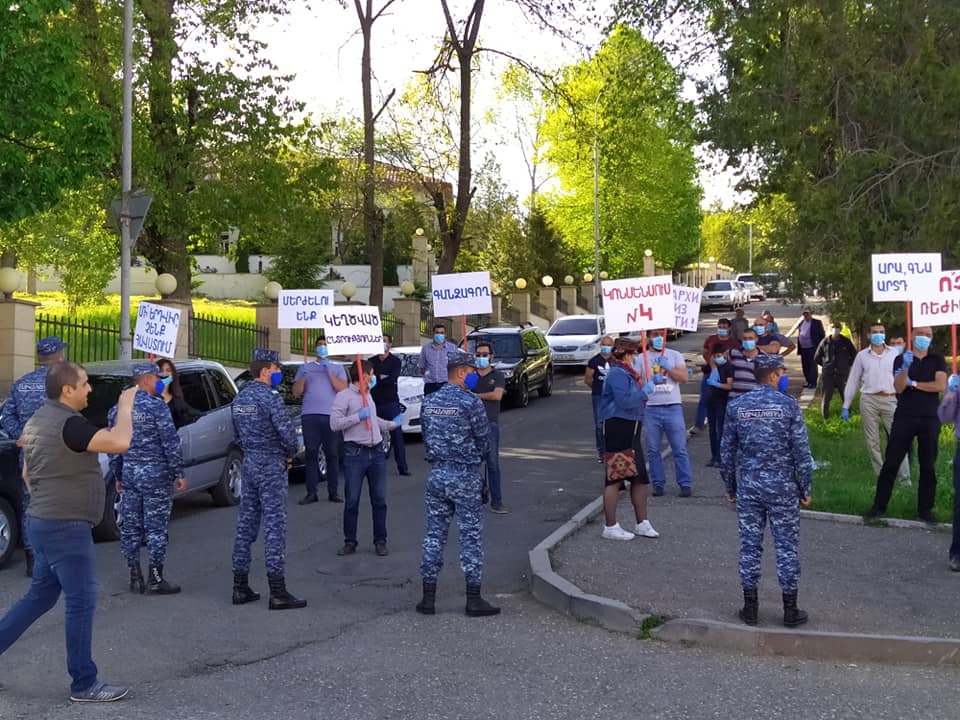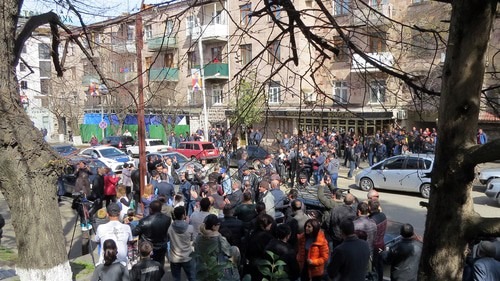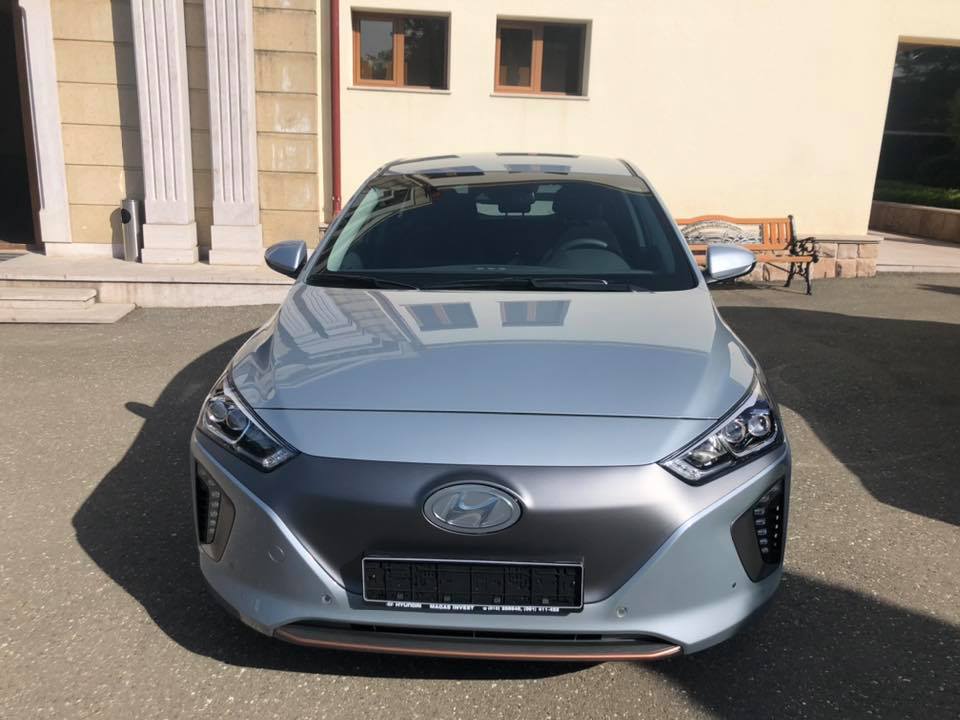President of Karabakh’s inauguration met with peaceful protest, but harsh statements
Recently-elected President of the Republic of Artsakh (Nagorno-Karabakh’s name for itself) Arayik Harutyunyan was inaugurated on May 22 in the Karabakh city of Shusha.
The top leadership of Armenia, headed by Prime Minister Nikol Pashinyan, was also present at the ceremony.
On March 31, Nagorno-Karabakh held both presidential and parliamentary elections. However, not one of the 14 presidential contenders won the required 50 percent or more votes to secure a victory. The second round took place on April 14, after which Arayik Harutyunyan was elected president.
The inauguration ceremony was closed, primarily in connection with the coronavirus pandemic. But while the newly elected president took the oath of allegiance to the ideals of democracy, nearby, around two dozen citizens held a protest rally.
- What can we expect from the new president of Nagorno-Karabakh?
- Karabakh to hold 2nd round of presidential elections despite coronavirus outbreak
- More on Nagorno-Karabakh
Activists on the Conscious Choice Party’s Facebook page uploaded photos and videos of the protest rally, which was closed even to journalists. Protestors carried signs saying: “Don’t make promises, we won’t believe,” “Down with corruption,” “Falsified elections,” “Down with the regime,” “Oligarchs get out,” and “We reject you.”
Police officers blocked off 500 meters around the building in all directions and security forces did not let anyone pass. Protesters stood directly in front of the blockade for about an hour.
Among the protesters were members of the Artsakh Revolutionary Party, which participated in the March 31 parliamentary elections. However, none of its members were elected to parliament, as it only won 2.26% of the vote.
Members of the Artsakh of Tomorrow Party, which also did not win any parliamentary seats, joined the protesters as well. This party supported another presidential candidate during the second round: Foreign Minister Masis Mayilyan.
During the protest, the leader of the Revolutionary Party Artur Osipyan live streamed himself calling the police and informing them that the protest would be peaceful. He said that the protesters did not intend to violate public order and asked the police to protect participants from possible provocations.

Tigran Petrosyan, Chairman of Artsakh of Tomorrow Party, said that they do not recognize the results of the election, the authority of the oligarchs, or the resurgence of the corrupt system:
“The elections were a circus, as numerous violations and falsifications were reported during the pre-election and election processes.”
The Revolutionary Party of Artsakh previously held a protest rally on April 5, a week before the second round of the presidential elections. The protesters demanded they the second round, which was scheduled to take place on April 14, be cancelled.

Experts say that the spirit of protest in Karabakh is high. This was expressed primarily in the turnout. The CEC reported that 47,165 people, or 44.9% of the total number of voters, participated in the second round of elections.
About 76% of voters participated in the first round. Observers say that disappointment after the first round discouraged half of the voters from even showing up to the polls. The coronavirus also played a role, as strict quarantine measures had already been introduced by the time the second round took place.
Nevertheless, 39,860 people voted for the former Prime Minister of Artsakh, Arayik Harutyunyan. 5,428 voted for Minister of Foreign Affairs Masis Mayilyan.
It is not yet clear whether the Revolutionary Party and the Conscious Choice Bloc have the potential to attract more people to their side. However, the protest rallies and demonstrations they organized have already attracted a lot of attention and are a testament to the fact that that there is a protest culture in the country. Information about the demonstrations is now being published on the Artsakh1.am Facebook page.
It is worth noting that the protesters are also dissatisfied with the policies of the Armenian leadership, which, in their opinion, did nothing to help promote the revolution in Karabakh and prevent the resurgence of the old oligarchy.
Meanwhile, in the speech he gave after the inauguration, Armenian Prime Minister Nikol Pashinyan said that he would not want to see a revolution or a counter-revolution in Artsakh. He called the elections in Karabakh a natural continuation of the non-violent revolution in Armenia, and said that Arayik Harutyunyan supported the revolution.
On May 21, before leaving for Karabakh, Nikol Pashinyan posted a picture of the newly-elected President of Karabakh’s car on social media with the caption:
“The newly elected President of Artsakh, Arayik Harutyunyan, will drive to work in this electric car.”

People say that it was a gift from the Armenian authorities.
The Armenian population in the Nagorno-Karabakh Republic lives as a de-facto independent republic, unrecognized by any government in the world, including Armenia.
From 1991-1994, an armed conflict known as the Karabakh War took place between Armenians and Azerbaijanis in territory of the former Nagorno-Karabakh Autonomous Region and the surrounding area. The war ended when a truce was signed, but exchange of gunfire still continues to break out periodically. After the main military stage of the conflict ended, ethnic Azerbaijanis left Karabakh. Azerbaijan considers Karabakh and the surrounding territory taken during the war to be occupied, and demands that it be returned to Azerbaijan..
Negotiations held to settle the conflict have not yet yielded results. The last full-scale outbreak, known as the “April War” or the “Four Day War,” took place in April of 2016. Ten people from each side were killed as a result of the conflict.
The terms, place names, opinions and ideas proposed by the author of this article are her / his own and do not necessarily coincide with the opinions and ideas of JAMnews or its individual employees. JAMnews reserves the right to remove comments that are deemed offensive, threatening, violent or ethically unacceptable for other reasons.



















